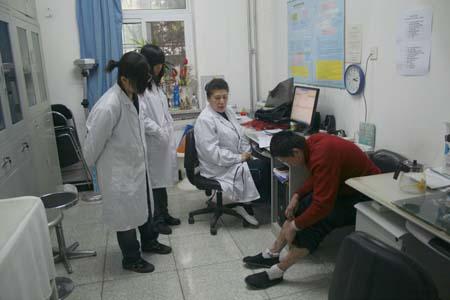Peking University, Jan. 11, 2011: Six medical students at Peking University Health Science Center (PUHSC) have established a campus clinic to provide free medical service, including pre-diagnostic aid and some medicines for migrant workers without medical insurance.
Xue Kan, 24, one of the six and a fifth-year medical student, told the Global Times that migrant workers usually don't go to hospitals when suffering minor illnesses because they lack medical insurance.
"The still uneasy relationship between doctors and patients world-wide also pushed us as future doctors to do something to improve the situation," he said.

Sunshine and Love Clinic students Qu Hui (far left) and Weng Jian (second from left) accompany a patient seeing a doctor in the campus hospital at Peking University Health Science Center (Courtesy of Jiang Xiaoxiao)
Sunshine and Love
The clinic, named Sunshine and Love Clinic, follows the US "student-run free clinic" (SRFC) model, according to Jiang Xiaoxiao, 22, also a fifth-year medical student and co-founder.
Jiang said that it was one of their classmates' experiences as a volunteer at a SRFC in the US that inspired them to start a similar one in China.
Last year, six medical students including Jiang and Xue, both then clinical medical science seniors, made a trip to Jacksonville, Florida and stayed there for two weeks to learn about operating a SRFC.
They also found that hospitals with a SRFC have a good reputation for better communication between patients and the medical staff.
Not just cures
Xue told the Global Times that modern biomedical care is developing into a three-part mode as "biology, psychology and society." Therefore, doctors need to concentrate on not only physical disease but also communicating well with their patents.
"It reminds us of the importance of communicating with patients to make them feel comfortable," he said. "Though the clinic is not big, it can work as an example to promote a concept - let medical students get involved in a noncommercial effort to help patients."
The clinic staff has grown from six to 40 students, including those studying clinical medical science, basic medicine and public health.
Xue said the clinic is exclusively organized and managed by students, with no teacher or doctor involvement.
Minor illnesses only
The clinic can't deal with complex diseases, but concentrates on common diseases, such as respiratory infections, gastrointestinal inflammation and diabetes.
"After the therapy, if the patients need to go to a hospital for further treatment, we will pay the expense," Xue told the Global Times.
"We don't have professional licenses. We are not responsible for diagnosis but for pre-diagnostic things, such as asking about patients' medical histories; organizing health activities, such as holding lectures, making healing-plans and accompanying patients to have physical examinations in the hospital," said Xue.
"The clinic is connected with the campus hospital at the center, so all the diagnostic work, therapy and prescriptions are done by doctors."
Building a bridge
From 11:30 am to 5:00 pm on the last Saturday of each month, the clinic refunds the patients all the expenses they paid at the campus hospital and gives them another checkup.
"We work as a bridge connecting the hospital and patients," said Jiang.
The clinic opened last October and has admitted 10 patients, most of whom are janitorial staff in the universities' cafeterias and classroom buildings. In order to qualify, patients must have no medical insurance and a monthly income of less than RMB1,150 ($174), and pass a clinic background check.
Xue said they targeted construction workers, but all they met were young, healthy who had no need for medical care.
Finding proper patients
"We met two ladies working for our school cafeteria who said they hoped to participate. So we decided to start from the staff members at our university," Jiang said.
Xue said that the clinic has an RMB6,000 donation from Jing Suozhu, a staff member at the Chinese council of an US-based international NGO - the International Association of Lions Clubs, and is seeking more financial support from charity foundations and companies.
Xu Yan, deputy director with the education office at the center said the clinic deserves a serious try. "Helping people in need is important to cultivate medical students' sense of social responsibility," she said.
How SRFC's work in the US
Student-run free health clinics has been popular among American medical schools for more than 40 years since the Carrboro-based Health Clinic, the oldest such operation in the US, was founded in University of North Carolina in 1968, according to the website of North Carolina University.
Among all the medical schools in the 50 states, 111 student-run clinics in 49 schools are operating in 25 states.
Each clinic has an average of 16 student volunteers a week, and all clinics have at least one faculty physician on site during operation. Clinics mainly receive funds from private or community grants, student fund-raising, or the government, according to the US-based Journal of International Medicine in 2007. Most student-run free health clinics are able to treat acute illness and manage chronic conditions, such as blood pressure checks, blood glucose readings and multivitamin distribution, according to the website of University of Pennsylvania's School of Medicine.
Extended Reading:
Opening of PKU Student-Run Free Clinic
Reported by: Liu Meng
Source: Global Times
Related News
Photos
More>>history
Traditions
- Symposium on Ruzang Compilation Project Attracts Korean and Japanese Scholars
- Beijing Forum 2010 to Hold Panel Session for Young Students
- Premier Wen Celebrates Youth Day with PKU Students
- First Annual China Youth Reproductive Health Research Report Released at PKU
- RusNano Executives Visit Peking University
arts
- PKU Prof. Pan Wenshi Wins World's Most Influential Chinese Award
- PKU and UPenn Vow Further Cooperation at PKU-UPenn Day
- 15 Professors from School of Foreign Languages of PKU Awarded Senior Translators
- Zhang Foundation Awards Lhasa Students
- Red Ribbon Rises with Hope: AIDS Awareness Week by School of Public Health





